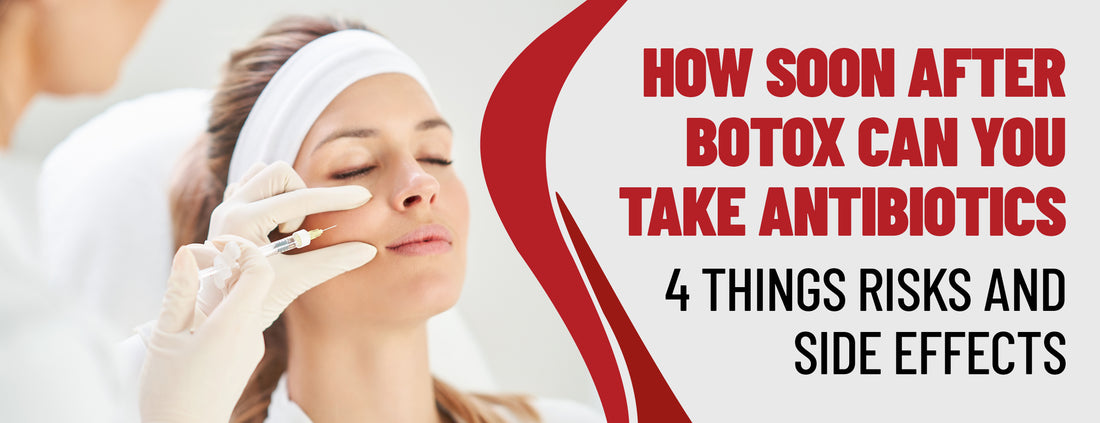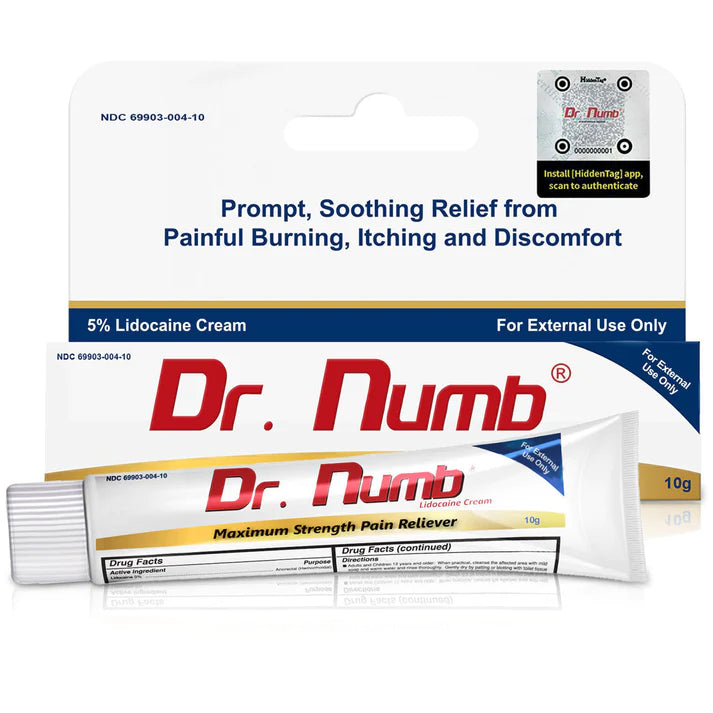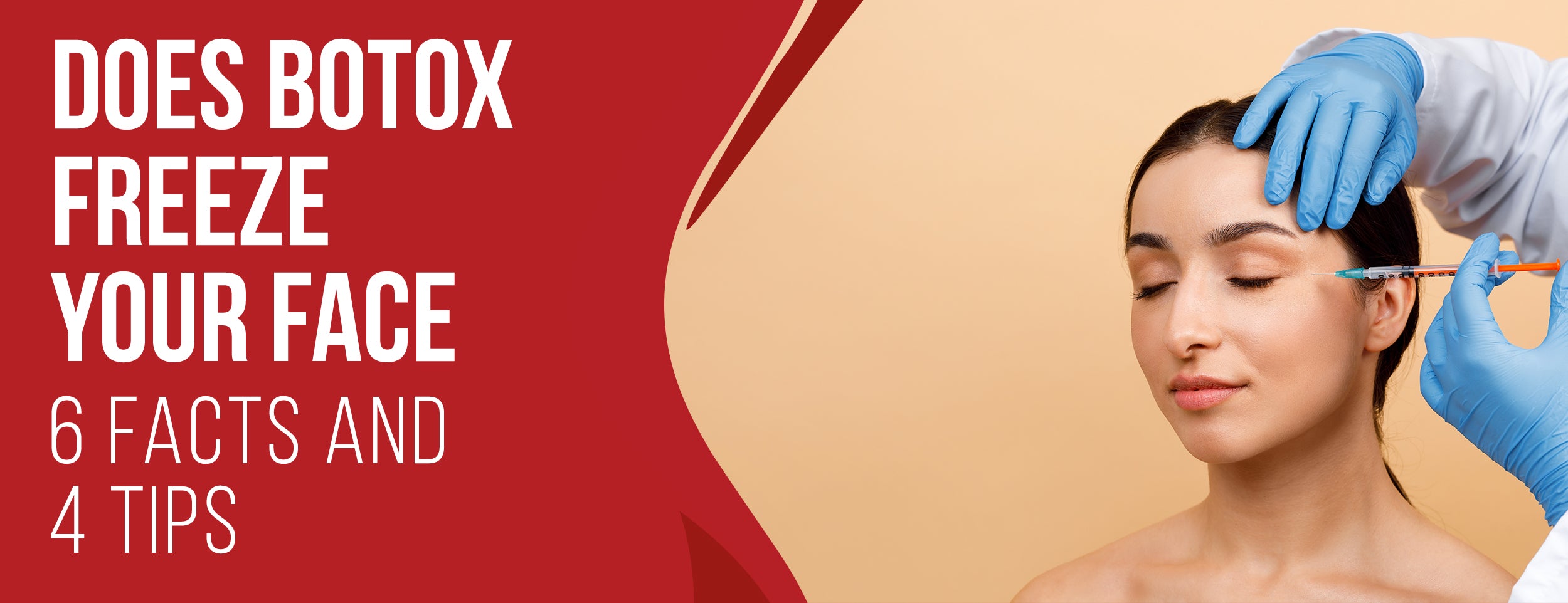You can generally receive Botox while taking antibiotics, but some antibiotics can impact the treatment. If you're on a course of aminoglycoside antibiotics, finishing them before getting Botox is advisable to avoid potential increased effects on the treated muscles. Most antibiotics used to fight infections do not interfere with Botox treatment.
You should wait at least 2 weeks after Botox before starting antibiotics to ensure the best results. The timing may vary based on the type of antibiotic and specific Botox treatment, so be sure to consult your healthcare provider.
In this post, we'll explore the factors to consider when taking antibiotics after Botox, the risks and side effects you need to be aware of, and the best practices for taking antibiotics safely and effectively.
How Soon After Botox Can You Take Antibiotics: 4 Things

One of the most frequently asked questions by patients who undergo Botox treatment is whether they can take antibiotics afterward. Here are some considerations after Botox:
Age
As we age, our bodies become less efficient at processing medications, including antibiotics. Older adults may be more susceptible to antibiotics, like gastrointestinal disturbances, allergic reactions, and drug interactions. Therefore, it is essential to consult with a healthcare professional before taking antibiotics, especially if you are over 65.
Medical History
If you have a history of allergic reactions to antibiotics or any other medication, it is imperative to disclose this information to your doctor. Some antibiotics can trigger allergic reactions, which can range from mild to life-threatening. Additionally, your doctor will adjust your antibiotic regimen accordingly if you have chronic illnesses, like liver or kidney disease.
Type of Botox Injection
Botox comes in different types, such as Cosmetic, Dysport, and Xeomin. Each type of injection has a slightly different formulation, and it is essential to inform your doctor of the specific type of Botox injection you received. Some antibiotics can interact with Botox and affect its efficacy , so your doctor must evaluate the safety and timing of antibiotic use.
Dosage and Frequency of Antibiotic Use
The frequency and dosage of antibiotics depend on the type of infection or condition being treated. Taking antibiotics too frequently or for an extended period can pose risks such as antibiotic resistance and decreasing the efficacy of the medication. You should follow your doctor's instructions and avoid self-medication or overuse of antibiotics.

Taking Antibiotics After Botox: Best Practices
While antibiotics can effectively prevent infection and manage complications, taking them at the wrong time or incorrectly can cause harm. We will explore how to take antibiotics after Botox.
Consultation with a Healthcare Provider
Before taking antibiotics after Botox, you should consult a healthcare provider. The doctor can determine if antibiotics are appropriate based on your medical history and Botox type. Some key points to keep in mind when consulting with a provider include:
- Discuss any previous reactions or allergies to antibiotics.
- Provide a detailed account of the Botox treatment you received, including the date, location, and type of injection.
- Inform your provider if you take other medications or supplements that may interact with antibiotics.
Proper Use and Dosing of Antibiotics
Once you have consulted with a healthcare provider, using antibiotics properly and following the recommended dosing guidelines is essential.
Reducing side effects or complications and improving the effectiveness of the treatment. Some best practices to keep in mind when taking antibiotics after Botox include:
- Take antibiotics exactly as prescribed and for the recommended duration.
- Avoid self-prescribing or sharing antibiotics with others, which can contribute to antibiotic resistance.
- Be aware of common antibiotic side effects like diarrhea and nausea, and inform your healthcare provider if these occur.
Signs of Allergic Reactions & Infection after Botox
Knowing the signs and symptoms of allergic reactions or infection after Botox is necessary. Then you can seek treatment promptly if required. Some key signs to watch for include:
- kin rash, itching, or hives.
- Swelling or redness at the injection site.
- Fever, chills, or flu-like symptoms.
- Pain or drainage from the injection site.
Following these best practices for taking antibiotics after Botox and staying vigilant for signs of allergic reactions or infection can help ensure a safe and successful treatment experience. Always consult a healthcare provider before taking any medication, and use antibiotics responsibly to help protect your health and well-being.
Antibiotics After Botox: Risks & Side Effects

There may be instances when people must take antibiotics after Botox treatment due to infection, illness, or other medical conditions. We will cover the risks and side effects of taking antibiotics after Botox.
Possible Interactions Between Antibiotics & Botox
Antibiotics can interact with Botox in various ways, leading to adverse effects. These include:
- Reduced effectiveness of Botox treatment.
- Delayed onset of Botox results.
- Increased risk of bruising, swelling, and infection.
- Worsening of pre-existing medical conditions.
Therefore, it is crucial to consult with your doctor before taking any antibiotics after Botox treatment.
Effects of Antibiotics on Botox Recovery
Antibiotics can significantly impact recovery from Botox treatment, affecting the healing process and final results. Some effects include:
- Slower recovery time due to decreased immunity.
- Increased swelling and bruising due to medication side effects.
- Longer healing time due to the body's weakened ability to repair itself.
Therefore, following the recommended post-care instructions is essential, and consult with your doctor if you need antibiotics after Botox.

Risks of Antibiotic Resistance
Bacteria become resistant to antibiotics, rendering such medication useless. Antibiotic misuse leads to antibiotic resistance, and it can lead to severe health complications. Some of the risks of antibiotic resistance include:
- Increased risk of infections that cannot be treated with antibiotics.
- Treatment may become more costly and time-consuming.
- More prolonged periods of illness and symptoms.
Therefore, it is essential to be mindful of how we use antibiotics and only take them when necessary, under proper medical supervision.
Conclusion
Understanding the timing of antibiotics after botox is critical for safe and effective treatment. Consult your healthcare provider and follow best practices to minimize risks and increase the chances of a successful outcome.
Remember to follow your provider's instructions and take antibiotics as prescribed. Optimum results are achievable by staying informed, being aware of potential risks, and taking appropriate measures for a safe and effective outcome.












